Edie Melson's Blog, page 16
May 4, 2025
How a Facebook Hack Renewed My Promise to God
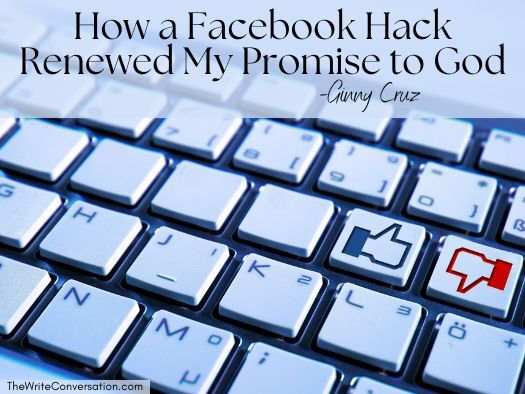
by Ginny Cruz, MPA, PT
It was a night like any other. When the umpteenth TV commercial selling the latest drug came on, I picked up my phone to check Facebook. But instead of seeing familiar faces, a message appeared stating, "We suspended your account." Further investigation revealed that a hacker had attached an Instagram account to my Meta Business Suite and posted content violating Meta's Community Standards.
My first reaction was shock. How could this happen? Then, my mind raced to find a way to appeal this travesty. If you have never had your account hacked, I hate to be the one to tell you that contacting Meta’s customer service is virtually impossible. There is no contact email, phone number, or chat service. They kindly offer a bunch of useless articles on the topic. However, those articles can only be read by logging into Facebook, which you cannot do when you are suspended.
If you have never heard it said, hear it now: Your platform for your writing must be built on an email subscriber list, not the whims of social media companies. My experience revealed the wisdom of the subscriber list. Just like that, all my Facebook followers and my ability to reach them vanished.
Working Through the Stages of Grief
The five stages of grief, developed by Elisabeth Kubler-Ross, are 1) denial, 2) anger, 3) bargaining, 4) depression, and 5) acceptance. It did not take long for me to progress through each one.
When the notice of suspension appeared, it seemed unreal. I experienced a few minutes of denial that this could happen to me. After some searching to see what had occurred, stage two anger erupted. Who was this hacker person? Why would someone do this? quickly followed by a strong desire to yell, Get a life and leave mine alone!
The bargaining phase led me to cry out to God and beg Him to intervene. Soon afterward, depression reared its ugly head and kept me company for a few weeks. Anger and sadness sat on my shoulders and sowed confusion as I prayed for relief. I could not even share my situation with my friends on Facebook.
Having spent years building a social media following with thousands of writer connections on Facebook, I felt part of me had died. Questions swirled during my prayer time: "How could I rebuild?" "How could I reconnect with all my writing friends? and “Why, oh why, was this happening to me? “I often pondered quitting because I had lost so much, and rebuilding felt overwhelming and deeply unfair.
A Renewal of Purpose
Has God ever allowed you to lose something you loved? Maybe you experienced pain like a part of your body was gone. That is how I felt losing my Facebook account. While it is petty compared to losing a loved one or losing a limb, it was part of me. But in the valley of the shadow of a social media death, with a book launch on the horizon, my spirit finally dragged itself to the stage of acceptance. Despite having professional tech assistance, there was no way to appeal and recover the accounts. They would eventually be removed along with my years of connections and content, like wisps of smoke dissolved in the wind.
In this dark place of deep sadness and loss, God reminded me of my promise to write for Him. Then and now, my heart was to inspire new mothers to follow Him and build Christian homes for their children. That goal kept me going over the past eighteen years as I worked to build a social media platform and get a book deal. So, despite the frustration of beginning again, I realized quitting was not an option.
Turning Pain Into Purpose
My choice was either to accept life without a Facebook presence or start over from scratch. Yes, other social media platforms exist, but writers connect on Facebook. My Word Weavers groups were all on there, and quitting that platform felt detrimental to my writing life.
It became clear that God wanted me to rebuild on top of the ashes. Leaning on His strength, I created another Facebook account and a new baby development support group called Tummy Time Prayers, where I share baby development tips and spiritual encouragement. The old is gone, and the new is born.
While losing my previous work and online presence still stings, with God's help, I will rebuild bigger and better. I aim to spread the message of Jesus into the hearts of new mothers, hoping they will follow Him and create a God-fearing home for their children. My time will no longer be spent looking backward at what was but moving forward as God leads.
My life verse continues to be, "Trust in the Lord with all your heart, and lean not on your own understanding; in all your ways acknowledge him, and he will make your paths straight" (Proverbs 3:5-6 NIV). One day, God may tell me why this happened, but for now, I journey on without knowing.
You may wonder how the culprit got into my account. My tech adviser thinks he hacked my password because I had not set up two-factor authentication protection. So, I can’t end without asking, “Do you have two-factor authentication set up on all your social media accounts?”
Click to TweetHow a Facebook Hack Renewed My Promise to God from author Ginny Cruz on @EdieMelson (Click to Tweet)
 Ginny Cruz, MPA, PT is a pediatric physical therapist, early intervention specialist, and award-winning author. Her writing encourages and teaches moms simple and effective ways to help their baby meet developmental milestones. In addition to writing, she enjoys hiking, reading, and camping with her husband. Find out more at ginnycruz.com, Instagram, or Facebook.
Ginny Cruz, MPA, PT is a pediatric physical therapist, early intervention specialist, and award-winning author. Her writing encourages and teaches moms simple and effective ways to help their baby meet developmental milestones. In addition to writing, she enjoys hiking, reading, and camping with her husband. Find out more at ginnycruz.com, Instagram, or Facebook.
Published on May 04, 2025 22:00
May 3, 2025
Spiritual Practices for Writers: The Practice of Discipline
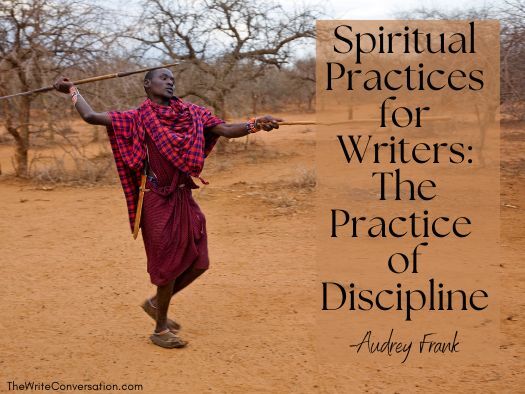
by Audrey Frank @AudreyCFrank
The one who neglects discipline ends up in poverty and shame, but the one who accepts reproof is honored. A desire fulfilled will be sweet to the soul… (Proverbs 13:18, 19a)
If you practice long enough, discipline leads to honor.
The honorable Maasai know about this. They live among Africa’s largest lion population in the great Serengeti plains. This Tanzanian savannah stretches across approximately 12,000 square miles. Natural runners, the Maasai run its length and breadth, practicing the discipline it takes to survive.
Purpose drives discipline. Running is essential to their lifestyle and necessary for hunting lions. The warriors run with spear in hand, always prepared. From an early age, Maasai boys practice, knowing that one day they will be the hunters, protectors, and cattle herders of their tribe. Along the way they face many reproofs, from the batting of a lion’s paw to the sound scolding of an elder. But they keep running, dreaming of the honorable day they run to kill their first lion, and run home bearing it between them in victory.
The Maasai run with purpose.
With purpose in mind, they practice.
The practice of discipline leads to honor.
Some people are natural writers. Writing is essential to living. They live life with pen in hand, for they are wordsmiths, and wordsmiths are tasked with the hunt for words that will protect, sustain, and preserve their communities and nations. Writers hunt down opportunities, chase the predators of self-doubt and discouragement, and rally beta readers. Along the way the face many reproofs, from the red-inked critique of that editor they admired or the deafening silence of rejection. Yet they press on through the stifling heat of looming deadlines, persevere on the last leg of content editing, and ruthlessly endure the long distance between idea and printed page. Writers dream of the honorable day they complete that book and run home in victory.
To be a writer is to be tasked with an honorable purpose. With practice, we can use our pens to fell the mighty lion that roars seeking to destroy hearts and homes today. (See 1 Peter 5:8-11).
Practice is such a grace-filled word. Lithe, lean, like the Maasai running for hours across the savannah, breath even, mind at peace. Failed yesterday? That’s okay. Practice invites you to try, try again.
Now all discipline seems painful at the time, not joyful. But later it produces the fruit of peace and righteousness for those trained by it (Hebrews 12:11).
Practice makes peaceful.
Lord, thank You for tasking me with an honorable purpose. Help me keep practicing. Amen.
NOTE: Click to Tweet (the free version that I use for Blogger) has closed. I'm looking for options, but right now I'm coming up empty. I hope you'll still share this post, anyway.
Don't Miss The Other Spiritual Practices for Writers! JANUARY: THE PRACTICE OF PLANNING FEBRUARY: THE PRACTICE OF TRUSTING MARCH: THE PRACTICE OF HOPING APRIL: THE PRACTICE OF WAITING May: The Practice of Discipline
 Audrey Frank is an author, speaker, and storyteller. The stories she shares are brave and true. They give voice to those whose words are silenced by shame, the hard things in life that don’t make sense, and the losses that leave us wondering if we will survive. Audrey and her family have spent over twenty years living and working among different cultures and world views, and she has found that God’s story of redemption spans every geography and culture. He is the God of Instead, giving honor instead of shame, gladness instead of mourning, hope instead of despair. Although she has three different degrees in communication and intercultural studies, Audrey’s greatest credential is that she is known and loved by the One who made her.
Audrey Frank is an author, speaker, and storyteller. The stories she shares are brave and true. They give voice to those whose words are silenced by shame, the hard things in life that don’t make sense, and the losses that leave us wondering if we will survive. Audrey and her family have spent over twenty years living and working among different cultures and world views, and she has found that God’s story of redemption spans every geography and culture. He is the God of Instead, giving honor instead of shame, gladness instead of mourning, hope instead of despair. Although she has three different degrees in communication and intercultural studies, Audrey’s greatest credential is that she is known and loved by the One who made her.Audrey is the author of Covered Glory: The Face of Honor and Shame in the Muslim World (Harvest House Publishers), an outpouring of Audrey’s heart to introduce others to the God of Instead. Shame is not unique to the developing world, the plight of the women behind veils, young girls trafficked across borders; shame is lurking in hearts everywhere. Through powerful stories from women around the world, Covered Glory illuminates the power of the Gospel to remove shame, giving honor instead. Available at favorite booksellers: BARNES & NOBLE, BOOKS A MILLION, AMAZON.
Published on May 03, 2025 22:00
May 2, 2025
How Writers Can Save Time Using a Style Sheet

by Tim Suddeth @TimSuddeth
Writing a book is not something you do in a day. Whether it’s fiction or nonfiction, creating a manuscript can take weeks, months, even years. And something that I’ve learned is expecting me to remember details from an earlier writing session is setting myself up for failure. Ain’t gonna happen.
What color was her eyes in chapter two? Did her neighbor drive up on a dirt bike or a four-wheeler? Was his name Max or Mac? If I’m not careful, I’lll spend most of my writing time thumbing back through the previous pages searching for details instead of enjoying ‘surfing the flow’.
This is where creating and using a style sheet comes in so handy. A style sheet lets you keep the details and choices you’ve made in your writing in one handy place.
Before we go any farther, let’s define a couple of terms. A style guide, like the Chicago Manual of Style (CMOS), is a manual that details the house style of a particular publisher, publication, etc. It’s the rule book. A style bible is used by screenwriters to keep the information for a group of writers on a particular show, episode, or season. A style sheet is what many editors use to record the information on characters, setting, general style, word spelling, etc. of a particular work. It’s the player’s handbook.
So, a style guide gives you the format and general style a publisher uses. A style guide is unique to that specific work.
A style sheet is a great tool for a writer. And you can start one at any time. It makes sense to start it when you start your book. Then you’re able to record the choices you make as you go along. Names, characters, dates, streets, spellings, hyphens all go on the sheet. Or you can start it when you begin your revisions. Just make a note of the details and anything that you or your partner might need to lookup. You can also create a style sheet after finishing the book; this will provide the information you may need should you decide to create a series.
Benefits When a Write Uses a Style Sheet
1. The Benefits of a Style Sheet
A. One place shoppingYou will still use a style guide like the CMOS and a dictionary for spelling. But I’m sure you can see the convenience of making a record for a particular story. You can find the answers to your decisions here. And if you’re writing with a co-writer, or when you hand your story to an editor, you have a document that shows the details and actions that are important to your story.
B. ContinuityWhen you use a style sheet, you don’t have to face the same over and over. Will ‘email’ be written with or without a hyphen? What if your writing takes place in the nineties? Does that make a difference?
It also helps when you’re writing with someone else. And when you’re writing a series. Your reader will choose book two expecting it to be similar in style and characterization to book one. And your sheet will have the information you need without having to thumb back through book one.
C. Time saverYou can keep this information in the notes and comments of Word and Scrivener, but with a style sheet, everything’s in one place. And since you’re the one creating the style sheet, you can organize it in whichever way makes the most sense to you.
2. Suggested Sections of a Style Sheet
The Chicago Guide to Copyediting Fiction by Amy J. Schneider goes into more detail about creating your style sheet and what to include. She maintains her style sheet in four documents, but you can keep it on just a couple of pages. She breaks her sheet into four sections: general style, characters, places, and timeline.
A. General style section includes places where you break from the regular style guide the publisher uses or the CMOS. The section also covers items with multiple possible formats, such as dates, times, heights, numbers, and punctuation. And anything that you had to look up can go here.
B. The character section may include a list of characters with their names, descriptions, attributes, and relationships. It includes animals and fantasy or science fiction figures. What do you need for ‘your’ story? Here you can track the description of the characters, quirks, the never and always like Ava has never eaten a kiwi.
Schneider recommends using chapter numbers, as page numbers will vary as you make changes to your story. She also suggests that you either list the names alphabetically or in categories, like family, friends, coworkers, others.
C. If your characters travel or you have characters in multiple areas, you may need a place section. In this section, you record streets, buildings, directions, right and left distinctions. Any record details that relate to the setting. The apartment was on the third floor. So, he can’t walk out of the backdoor into the garden without going downstairs.
D. You could need a timeline for your story. Whether you have multiple timelines, your saga covers decades, or it takes place in a week, it helps to record when and in what order the action happens. You don’t want your character leaving work at five o’clock, to go to a three o’clock doctor’s appointment.
E. You can use an alphabetical word list. These are words that are commonly used in your manuscript. Include words that have multiple spellings, hyphens, unfamiliar words, or words that you find yourself looking up.
The important thing to remember about your style sheet is that it’s there to help you. Add what you need. Organize it in a way that works for you. It can either be online where you can quickly make changes, or you can write it in a notebook. Keep it simple. Write in it what you need and only what you need. The two important things are about a style sheet is that it has the information you need and that the information is easy to locate.
The goal for making a style sheet is to help you. Not to add another task to your already too long list. In software design, there’s the principle of good enough (POGE). The quick and simple design is better than a more complicated system. It’s the same with your style sheet. Make it a tool that enables you to more efficiently spend your time writing.
I hope you find this tool beneficial. What inconsistency have you found in a story that made you sit up? I would love to see it in the comments.
Happy writing.
TWEETABLESorry folks, Click to Tweet has gone out of business!
You can copy and paste the update below into any social media network:
How Writers Can Save Time Using a Style Sheet from @TimSuddeth on @EdieMelson https://thewriteconversation.blogspot... #writing #writingtips
 Tim Suddeth is a stay-at-home dad and butler for his wonderful, adult son with autism. He has written numerous blogs posts, short stories, and three novels waiting for publication. He is a frequent attendee at writers conferences, including the Blue Ridge Mountain Christian Writers Conference and a member of Word Weavers and ACFW. He lives near Greenville, SC where he shares a house with a bossy Shorky and three too-curious Persians. You can find him on Facebook and Twitter, as well as at www.timingreenville.com and www.openingamystery.com.
Tim Suddeth is a stay-at-home dad and butler for his wonderful, adult son with autism. He has written numerous blogs posts, short stories, and three novels waiting for publication. He is a frequent attendee at writers conferences, including the Blue Ridge Mountain Christian Writers Conference and a member of Word Weavers and ACFW. He lives near Greenville, SC where he shares a house with a bossy Shorky and three too-curious Persians. You can find him on Facebook and Twitter, as well as at www.timingreenville.com and www.openingamystery.com.
Published on May 02, 2025 22:00
May 1, 2025
Do I need an ISBN if I self-publish my book?
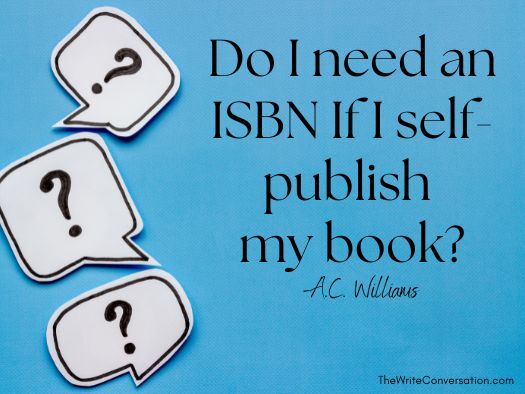
by A.C. Williams @ACW_Author
One of the most common areas of confusion among authors who want to self publish is ISBNs. Depending how you want to publish and where you want to publish, ISBNs are a vital part of book production. Fortunately, they’re relatively easy to understand once you get a basic foundation for them.
We are currently in a series about self-publishing. We took a break in April, but so far we’ve already talked about making sure you know your goals for self-publishing as well as understanding your legal rights as a self-published author. This month, we’re talking about ISBNs.
Information About ISBNs for Writers
First off, what is an ISBN? An ISBN, or International Standard Book Number, is a 13-digit identification number for your book. Think of it like your book’s social security number or its fingerprint. It’s unique to your book, and it allows publishers and booksellers to track and correctly recognize your book. This is how two books can have the same title and still be distinct.
If you’ve ever looked at the back cover of a physical book, you’ve probably seen a barcode. That barcode is generated from the book’s ISBN.
Secondly, why do ISBNs matter? Well, aside from distinguishing books from each other, tracking an ISBN is how the industry can tell how well a book is selling, how many copies have been moved, etc. Of course, that depends on if the distributor/retailer posts sales information. But, in general, an ISBN allows anyone looking for your book to find it with minimal effort. This includes search queries in libraries, bookstores, or even on internet browsers.
Thirdly, how can you get an ISBN? If you live in the United States, there is only once place to get an official ISBN: Bowker Publishing Services (https://www.myidentifiers.com/). If you see ads or promotions from anyone else other than Bowker or their other business name MyIdentifiers, don’t click. Only Bowker can distribute ISBNs.
If you are outside the United States, you’ll need to look up your country’s ISBN agency (https://www.isbn-international.org/agencies).
Now, ISBNs seem pretty expensive. One ISBN will cost you $125. That’s why it’s usually a good idea to buy them in bulk, since you can get 10 ISBNs for about $300. Doing the math, that makes them $30 each rather than $125. And you will use them, because every different format of your book requires a separate ISBN.
So, what books require an ISBN? Here’s where things start getting a little complicated.
You must have a different ISBN for every different format of your book. That means your ebook, your paperback, your hardback, and your audiobook versions (books on CD) all need individual ISBNs. If you update your book with a new cover and interior, you must have a new ISBN. If you create a version of your book in a different language, you will need a different ISBN.
If you only publish electronic versions of your book, even MP3 versions of your audio distributed on Audible or Apple Books, you may not need an ISBN. And if you only plan to distribute your books on your own website, you don’t need an ISBN.
It isn’t uncommon to end up using at least five ISBNs for a single title, and that doesn’t even include translated versions of your book. So don’t fret about purchasing 10 at a time. You’ll use them.
But what if you don’t want to buy them? What if it’s just not in your budget to drop $300 on ISBNs? Well, here’s the thing: Many self-publishing platforms offer ISBNs for no charge to you.
Amazon KDP, IngramSpark, Blurb, Bookbaby, Smashwords, and Draft2Digital all offer free ISBNs. However, if you use this free option, that printer will be listed as the book’s publisher on its detail page. Amazon will list a self-published book with a free ISBN as “independently published.” If you have purchased your own ISBNs, the publisher will be listed as whatever entity you have used to identify yourself.
But does every book actually need an ISBN? Well, that depends.
Are you publishing your book physically? As in a paperback or a hardback version of your book. If the answer is yes, then YES you must have an ISBN. It can be either a free ISBN or a paid ISBN, but you must have one.
If the answer is no, and you plan to only publish your book electronically, many times the answer is NO. That’s not always the case though, as some publishers and distributors require an ISBN for ebooks too. So you’ll need to know where you plan to publish and how you want to distribute your ebooks.
Of course, if you want your publishing company’s name listed on the book’s detail page, then you must have a paid ISBN.
A few extra tidbits to remember: ISBNs don’t expire. So make sure you keep your login information for MyIdentifiers in a safe place. You don’t want to lose access to them. If you buy a whole bunch of them, they will keep until you are ready to use them. But if you lose your login info, you won’t be able to get in.You need an ISBN for a barcode, but the barcode and the ISBN are different. You don’t need to purchase the barcode separately in most instances. If you have an ISBN already purchased, once you enter it in your self-publishing platform, it will generate the barcode for your print book automatically. There are some exceptions, of course, so make sure you read the fine print before you begin the self-publishing process. Also, understand the difference between an ASIN and an ISBN. The ASIN is an identifying number used specifically on Amazon. It’s basically Amazon’s version of an ISBN, probably because Amazon has so many books. Both print books and ebooks get an ASIN. It is assigned automatically by Amazon.
ISBNs can get complicated, but once you understand the basics, they become an excellent tool for marketing, promotion, and organization.
TWEETABLEDo I need an ISBN if I self-publish my book? from @ACW_Author on @EdieMelson (Click to Tweet)
Don't miss the other posts in the series: Information for Self Publishing Why Do You Want Your Book to Be Republished Why Contracts Matter if an Author Plans to Self Publish
 A.C. Williams, also known as Amy C. Williams, is a coffee-drinking, sushi-eating, story-telling nerd who loves cats, country living, and all things Japanese. Author of more than 20 books, she keeps her fiction readers laughing with wildly imaginative adventures about samurai superheroes, clumsy church secretaries, and goofy malfunctioning androids; her non-fiction readers just laugh at her and the hysterical life experiences she’s survived. If that’s your cup of tea (or coffee), join the fun at www.amycwilliams.com.
A.C. Williams, also known as Amy C. Williams, is a coffee-drinking, sushi-eating, story-telling nerd who loves cats, country living, and all things Japanese. Author of more than 20 books, she keeps her fiction readers laughing with wildly imaginative adventures about samurai superheroes, clumsy church secretaries, and goofy malfunctioning androids; her non-fiction readers just laugh at her and the hysterical life experiences she’s survived. If that’s your cup of tea (or coffee), join the fun at www.amycwilliams.com.
Published on May 01, 2025 22:00
April 30, 2025
My New Favorite Writing Book: Delve, Pivot, Propel by Steven James
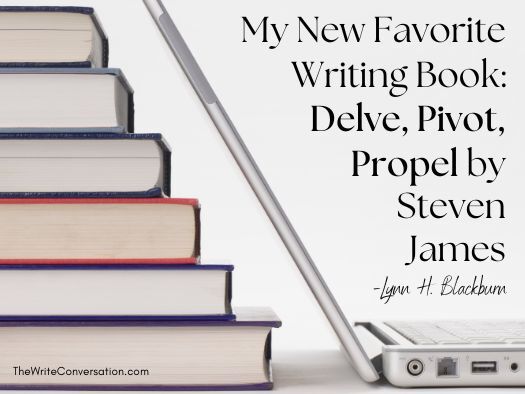
by Lynn H. Blackburn @LynnHBlackburn
Delve, Pivot, Propel by Steven James is now in my Top 5 craft books that I recommend to writers.
Fun fact: Story Trumps Structure by Steven James is my #1. So, clearly, I’m a fan of Steven James’s storytelling approach.
I could probably begin and end this post by saying, “Buy it, read it, mark it up, highlight it, put sticky tabs on the things you most resonate with, refer back often.” And, this would be the shortest post in The Write Conversation history!
But I’ll give you more to go on than that!
If the following are true of you, you should definitely check out Delve, Pivot, Propel:
1. You’re an organic writer.
Some call this writing by the seat of your pants, pantsing, or discovery writing. I call this “Outlining spells the death of my story, and I can’t write any other way.” Dramatic? Maybe. Accurate? 100%. This is not a criticism of my outlining friends. But here’s the thing: There are tons of craft books out there that teach how to write by an outline. There are precious few that present craft advice from an organic lens. Delve, Pivot, Propel does.
2. You’re a new writer.
If you’re drowning in writing advice but know enough to know that you don’t know enough (say that 5x fast), the structure of Delve, Pivot, Propel will be a lovely relief. The tagline is 350 Writing Secrets to Elevate Your Storytelling and Transform Your Novel. 350! That’s a LOT of writing wisdom presented bite-sized. Read one a day, take your time, absorb, ponder, and let the knowledge soak in.
3. You’re an experienced writer.
Let’s say you’ve written quite a few books, read every book on craft you can find, and don’t know if there’s anything more you can cram into your brain. But you also long for each book you write to be better than the last. The 350 secrets in this book are broken into ten sections covering everything from characterization to how to cut a scene you love.
4. You’re in the middle of writing a book.
The middle. Ugh. The point where many of us struggle with existential dread about our life choices and wonder how, how, how we will create a story that anyone would want to read? It’s time to check out the sections on Status, Tension, and Believability, and Scenes and Struggles. Or maybe you need Story Progression and Characterization to help you see why the story is lagging?
5. You’re getting ready to write a new book.
This is where I land. Not only am I about to begin a new book, but I’m also starting a new series. As an organic writer, I have very little information about where these stories will end up. I have some key components set because, wild as this is, my publisher doesn’t just hand me money and a contract and say, “We’ll be happy with anything.” I had to give them something! This will be my 4th series. I want it to be better than the three that preceded it. I want to stretch my muscles and create characters and stories that stick with my readers. What better time than now to spend time stretching my craft muscles?
Please note that numbers two through five on this list don’t care if you’re an outliner or an organic writer! You can use the wisdom in this book to craft a stronger, more compelling story.
I highly recommend it!
Grace and peace,Lynn
TWEETABLEMy New Favorite Writing Book: Delve, Pivot, Propel by Steven James, a review from @LynnHBlackburn on @EdieMelson (Click to Tweet)
 Lynn H. Blackburn is the award-winning author of Unknown Threat, Malicious Intent, and Under Fire, as well as the Dive Team Investigations series. She loves writing swoon-worthy southern suspense because her childhood fantasy was to become a spy, but her grown-up reality is that she's a huge chicken and would have been caught on her first mission. She prefers to live vicariously through her characters by putting them into terrifying situations while she's sitting at home in her pajamas! She lives in Simpsonville, South Carolina, with her true love, Brian, and their three children. Learn more at www.lynnhblackburn.com.
Lynn H. Blackburn is the award-winning author of Unknown Threat, Malicious Intent, and Under Fire, as well as the Dive Team Investigations series. She loves writing swoon-worthy southern suspense because her childhood fantasy was to become a spy, but her grown-up reality is that she's a huge chicken and would have been caught on her first mission. She prefers to live vicariously through her characters by putting them into terrifying situations while she's sitting at home in her pajamas! She lives in Simpsonville, South Carolina, with her true love, Brian, and their three children. Learn more at www.lynnhblackburn.com.
Published on April 30, 2025 22:00
April 29, 2025
May Inspiration for Writing Social Media Posts, Articles, and Blog Posts
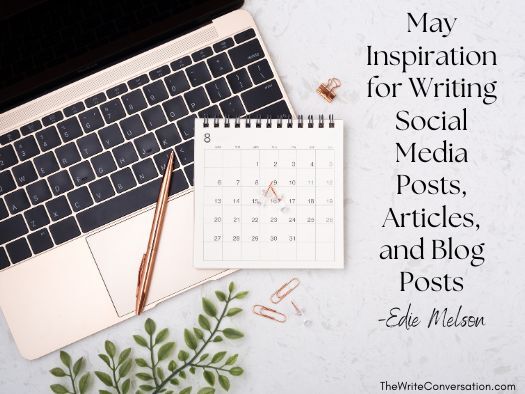
by Edie Melson @EdieMelson
April is almost over so let’s get a jump start for May writing ideas. The calendar is a great place to start when we’re looking for writing ideas. Crazy (and even legit) holidays are great conversation starters for social media sites, articles, and blogging. This month is especially fun for writers because of all the writing/reading related holidays. How many can you find? Be sure to leave your thoughts in the comment section at the end of the post.
The Month of May is:National Miniature Garden MonthJewish American Heritage MonthBetter Speech and Language MonthALS Awareness MonthSkin Cancer Awareness MonthNational Preservation MonthNational Wildfire Awareness MonthNational Cystic Fibrosis Awareness MothNational Foster Care MonthCorrect Your Posture MonthInternational Drum MonthNational dental Care MonthCeliac Disease Awareness MonthEhlers-Danlos Syndrome Awareness MonthNational Asparagus MonthNational Stroke Awareness MonthNational Moving MonthNational Brain Tumor Awareness MonthNational Mental Health Awareness MonthMotor cycle Safety Awareness MonthNational Military Appreciation MonthMelanoma Awareness MonthNational Water Safety MonthNational Chamber Music MonthNational Strawberry MonthNational Salsa MonthNational Salad MonthNational Recommitment MonthNational Photography MonthNational Lyme Disease Awareness MonthNational Hamburger MonthNational Get Caught Reading MothNational Egg MonthNational Barbecue MonthNational Bike MonthOlder Americans MonthDate Your Mate MonthNational Inventors MonthAmerican Cheese Month
May Special WeeksNational Eastern Box Turtle Week: First Full Week in MayPublic Service Recognition Week: Begins the first Sunday in MayScreen0Free Week: First Full Week in MayChoose Privacy Week: First Full Week in MayNational Wildflower Week: First Full Week in MayNurses Week: May 6 – 12National Police Week: Week of May 15National Salvation Army Week: Second Full Week in MayNational Etiquette Week: Begins Monday of the Second Full Week in MayTeacher Appreciation Week: First Monday through FridayNational Hospital Week: First Full Week of MayNational Pet Week: First Sunday through Saturday in MaySmall Business Week: First Week in MayNational EMS Week: Third Full Week in MayNational Public Works Week: Third Week in May
May Special Days
May 1May DaySchool Principals’ DayLaw DaySilver Star Service Banner DayNational Day of PrayerNational Chocolate Parfait DayNational Mother Goose DayNational Loyalty DayBatman DayHug Your Cat Day
May 2School Lunch hero Day (First Friday in May)National Space Day (First Friday in May)National Life Insurance DayNational Truffle DayNo Pants Day
May 3National Scrapbook Day (First Saturday in May)National Play Outside Day (First Saturday of EVERY month)National Fitness Day (First Saturday in May)Kentucky Derby (First Saturday in May)Join Hands Day (First Saturday in May)National Montana DayFree Comic Book Day (First Saturday in May)National Textiles DayNational Start Seeing Monarchs DayNational Raspberry Popover DayNational Chocolate Custard DayNational Paranormal DayNational Two Different Colored Shoes DayNational Specially-Abled Pets DayNational Garden Meditation DayNational Lumpy Rug DayHerb Day
May 4National Lemonade Day (First Sunday in May)National Infertility Survival Day (Sunday Before Mother’s Day)National Self-employed DayBird DayNational Weather Observers DayNational Candied Orange Peel DayNational Orange Juice DayNational Renewal DayNational Star Wars DayNational Day of Reason
May 5National Silence the Shame DayCinco De MayoNational Astronaut DayMelanoma MondayNational Hoagie DayNational Totally Chipotle DayNational Cartoonists DaySquare Root Day
May 6National Foster Care Day (First Tuesday in May)National Teacher Appreciation Day (Tuesday of First Full Week in May)National Crepe Suzette DayNational Beverage DayNational Nurses Day
May 7 National Tourism DayNational Interpreter Appreciation Day (First Wednesday in May)National Skilled Trades Day (First Wednesday in May)National School Nurse Day (Wednesday of National Nurses Week)National Packaging Design DayNational Barrier Awareness DayNational Roast Leg of Lamb Day
May 8National Student Nurse Day National Have a Coke DayNational Coconut Cream Pie Day
May 9National Knock Out Rose Day (Friday before Mother’s Day)National Home Front Heroes DayNational Alphabet Magnet DayNational Sleepover DayNational Military Spouse Appreciation Day (Friday before Mother’s Day)National Provider Appreciation Day (Friday before Mother’s Day)National Butterscotch Brownie DayNational Moscato DayNational Lost Sock Memorial Day
May 10National Washington DayNational Dog Mom’s Day (Second Saturday in May)National Clean Up Your Room DayNational Lipid DayNational Archery Day (Second Saturday in May)National Miniature Golf Day (Second Saturday in MayNational Babysitter’s Day (Saturday before Mother’s Day)National Birth Mother’s Day (Saturday before Mother’s Day)Stamp Out Hunger Food Drive Day (Second Saturday in May)National Shrimp Day
May 11National Eat What You Want DayMother’s Day (Second Sunday in May)National Foam Rolling DayNational Twilight Zone Day
May 12National Fibromyalgia Awareness DayNational Women’s Checkup Day (Second Monday in May)National Nutty Fudge DayNational Odometer DayNational Limerick Day
May 13National Crouton DayNational Fruit Cocktail DayNational Apple Pie DayNational Frog Jumping DayNational Decency Day
May 14National third Sift Workers Day (Second Wednesday in May)National Buttermilk Biscuit DayNational Underground America DayNational Dance Like a Chicken DayNational Receptionists Day (Second Wednesday in May)
May 15Bring Flowers to Someone DayNational Nylon Stocking DayNational Chocolate Chip DayPeace Officers Memorial Day
May 16Nascar Day (Third Friday in May)National Pizza Party Day (Third Friday in May)National Bike to Work Day (Third Friday in May)National Defense Transportation Day (Third Friday in May)National Endangered Species Day (Third Friday in May)National Biographer’s DayNational Sea Monkey DayNational Love a Tree DayNational Classic Movie DayNational Barbecue DayNational Do Something Good for Your Neighbor DayNational Piercing Day
May 17National Learn to Swim Day (Third Saturday in May)Armed Forces Day (Third Saturday in May)National Idaho DayNational Cherry Cobbler DayNational Pack Rat DayNational Graduation Tassel DayNational Walnut Day
May 18National Take Your Parents to the Playground Day (Third Sunday in May)National Cheese Soufflé DayNational No Dirty Dishes DayNational Visit Your Relatives Day
May 19National Roadie DayNational Devil’s Food Cake DayNational May Ray Day
May 20National Quiche Lorraine DayNational Sugarbee Apple DayNational Streaming DayNational Rescue Dog DayNational Pick Strawberries DayNational Be a Millionaire Day
May 21National Juice Slush Day (Third Wednesday in May)Emergency Medical Services for Children Day (Wednesday of EMS Week)National Memo DayNational Strawberries and Cream DayNational Waitstaff DayNational American Red Cross Founder’s DayTalk Like Yoda Day
May 22National Solitaire DayNational Vanilla Pudding DayNational Buy a Musical Instrument DayNational Maritime Day
May 23National Road Trip Day (Friday before Memorial Day)National Cooler Day (Friday before Memorial Day)National Don’t Fry Day (Friday before Memorial Day)National Taffy DayNational Lucky Penny Day
May 24National Wyoming DayBrother’s DayAviation Maintenance Technician DayNational Escargot DayNational Scavenger Hunt Day
May 25 National Family Fun Day (Sunday Before Memorial Day)Geek Pride Day Towel DayNational Brown-Bag-It DayNational Tap Dance DayNational Missing Children’s Day
May 26Memorial Day (Last Monday in May)National Paper Airplane DayNational Blueberry Cheesecake DayWorld Lindy Hop Day
May 27National Grape DayNational Grape Popsicle DayNational Cellophane Tape DaySun screen Day
May 28National Flip Flop Day (Wednesday After Memorial Day)National Senior Health & Fitness Day (Last Wednesday in MayNational Beef Burger DayNational Brisket Day
May 29National 529 DayNational Coq Au Vin DayNational Paperclip Day
May 30National Creativity DayNational Hole in My Bucket DayNational Water a Flower Day
May 31National Utah DayNecrotizing Fascitis Awareness DayNational Smile DayNational Autonomous Vehicle DayNational Macaroon DayNational Speak in Complete Sentences DayNational save Your Hearing Day
Now it's your turn. What holidays inspire you? Do any of them strike a nerve for marketing or a fun post? Share how you'll use them in the comments section below and inspire us!
Don't forget to join the conversation!Blessings, Edie
If you're interested in doing your own research into holidays, here are several websites to get you started!Brownie Lock: https://www.brownielocks.com/month2.htmlHoliday Insights: https://www.holidayinsights.com/moreholidays/april.htmNational Day Calendar: https://www.nationaldaycalendar.com/year-at-a-glance
TWEETABLEMay Inspiration for Writing Social Media Posts, Articles, and Blog Posts from @EdieMelson (Click to Tweet)
 Edie Melson is a woman of faith with ink-stained fingers observing life through the lens of her camera. She’s a writer who feels lost without her camera and a card-carrying introvert who loves to encourage an audience. She also embraces the ultimate contradiction of being an organized creative. As a popular speaker, she’s encouraged and challenged audiences across the country and around the world. Her numerous books, including the award-winning Soul Care series reflect her passion to help others develop the strength of their God-given gifts and apply them to their lives.
Edie Melson is a woman of faith with ink-stained fingers observing life through the lens of her camera. She’s a writer who feels lost without her camera and a card-carrying introvert who loves to encourage an audience. She also embraces the ultimate contradiction of being an organized creative. As a popular speaker, she’s encouraged and challenged audiences across the country and around the world. Her numerous books, including the award-winning Soul Care series reflect her passion to help others develop the strength of their God-given gifts and apply them to their lives.She and husband Kirk have been married 43+ years, and live near their three sons and three grandchildren in the foothills of the Blue Ridge Mountains. Edie and Kirk can often be found with their big black dog hiking—Edie hanging off ledges for the best camera angle and Kirk patiently carrying her tripod. Connect with her on her website, WWW.EDIEMELSON.COM and through social media.
Published on April 29, 2025 22:00
April 28, 2025
Have You Fallen into the TMI Trap on Social Media?
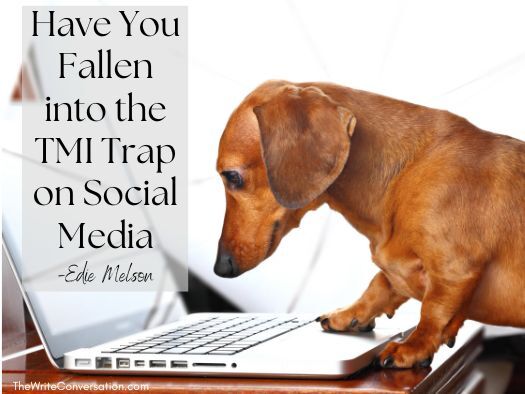
by Edie Melson @EdieMelson
For an author, building an online presence that’s both professional and personable can be a bit of a tightrope walk. After all, we’ve all cringed at some of the intimate details shared in ill-considered tweets and Facebook posts. We want to connect with our readers as honestly and as genuinely as possible. But we also want to present ourselves as the professionals we are. I’ve had a lot of writers ask for guidance on where to draw that line.
The good news is that there are some guidelines you can follows. The bad news is, there are exceptions to almost every rule. Each author relates differently in person and to be authentic, we must carry that personal bent into our online presence.
Things to Share OnlineThere are some things we all enjoy sharing, whether or not we’re directly involved. That’s where this list fits. It’s not an exhaustive list, but I’m including enough suggestions so you can get a strong idea of what’s good to share. These things shouldn’t make up the majority of your social media updates or blog posts, but sprinkling them in can make you more approachable and even fun.An engagement or a wedding. This can be yours, or a close family member. You don’t want to take up space about a second cousin once removed, but engagement pictures are always fun to see.New baby or grandbaby. Again, we all like to see this occasionally. New life is a reason to celebrate. But with this type of update, like the previous one, a little bit goes a long way. If you want to post an album of photos, that’s fine, but don’t share photo after photo after photo in your news feed.Pet photos and stories. People love their pets. More than that, they love people who love pets. This type of a personal update can give you some good visibility through social media.Exciting news that’s publishing related. This might be a book cover reveal, signing a contract with a publisher and/or agent, even winning a contest.A recipe. Recipes are popular on social media. But if you’re not writing a cookbook, or incorporating recipes in your platform, share sparingly.Prayer requests. I purposely included this at the end of the list because you must be very careful here. First, you need to be aware that people will share what you share, so make sure it’s not confidential and you don’t mind if everyone knows about it. Second, you’re opening a door. Once you share a prayer request, your friends and followers will feel free to share with you. You could be opening a floodgate. That’s not always a bad thing, but it’s a decision you need to make before you share.
Things NOT to Share OnlineI hate to even have to say it, but anything that might trigger a gross-out response should always be off limits. This includes everything from descriptions of medical procedures, accidents, trips to the personal facilities and spiders. Yep, spiders. There are a lot of people out there who will freak out at the picture of a leggy arachnid, so post at your own risk.Anything negative about a specific person or company. This doesn’t include rants about generalities, such as taxes. But I’ve NEVER seen an instance where calling someone out publicly ended well for either party.Any update that lets people know your home is vacant. This isn’t something that will offend your followers, but is a danger for you personally. Posting vacation pictures, while you’re still away, is an open invitation to burglars.Any update that shows you checking in someplace. If you want to endorse a place, share why you enjoyed your experience. But for all our sakes, disable location settings that pop up with a map of where you are in your social media feeds.
Bottom LineNavigating our interactions online is a lot like attending a large party. All the same rules apply.Don’t hog the conversation.Don’t talk about yourself too much.Don’t share things that make others uncomfortable.Don’t gossip.Don’t bash someone’s reputation.
Trust me, you do not want to be the person everyone at the party avoids. Being personable and sharing bits of your personal life online can enhance your overall image. Staying upbeat, encouraging and positive whenever possible will make you someone people want to know, online and off.
TWEETABLEHave You Fallen into the TMI Trap on Social Media from @EdieMelson (Click to Tweet)
 Edie Melson is a woman of faith with ink-stained fingers observing life through the lens of her camera. No matter whether she’s talking to writers, entrepreneurs, or readers, her first advice is always “Find your voice, live your story.” As an author, blogger, and speaker she’s encouraged and challenged audiences across the country and around the world. Her numerous books reflect her passion to help others develop the strength of their God-given gifts and apply them to their lives. Connect with her on her website, through Facebook, Twitter and Instagram.
Edie Melson is a woman of faith with ink-stained fingers observing life through the lens of her camera. No matter whether she’s talking to writers, entrepreneurs, or readers, her first advice is always “Find your voice, live your story.” As an author, blogger, and speaker she’s encouraged and challenged audiences across the country and around the world. Her numerous books reflect her passion to help others develop the strength of their God-given gifts and apply them to their lives. Connect with her on her website, through Facebook, Twitter and Instagram.
Published on April 28, 2025 22:00
April 27, 2025
What Do You Do When You Lose a Writing Contest?

by Ane Mulligan @AneMulligan
You kick the cabinets.You whack the tops off your roses.You burn the bacon.You kick the cat … well maybe not this one. But you'd like to when they raise their smug eyes to yours. You know they're calling you a loser. But cats will do that even if you win.
The thing is, we all get a little defensive about our babies, even if you have seasoned rhino skin. You need to release some of the angst, let off some of the steam before you blow. Then you can go back and analyze why you lost the contest or agent or contract.
Let's face it, nobody wins all the time. Besides, we're in a business that is highly subjective. So what do you do?
I've found if it's a contest entry from which you receive the judges' comments, look at the scores, them put them away for a day or two before reading their comments. A couple of days distance helps remove any sting.
When it's a completed book, you either final or not (then you win or not). You could win one year and not even final the next year with an equally well-written book.
So, what happened?
Again, fiction is subjective. Perhaps the theme or some minor mention of something in the story is a hot button for a judge. I remember once an editor said I had an agenda in one manuscript. I didn't. Not at all. It just happened that something in the story hit a sore spot.
There are any number of reasons, but the most important thing to factor in is God. “For everything there is a season a time to every purpose under Heaven.” Ecc 3:1
Father has a reason for giving favor to one book over another. Two years ago, I won the Selah Award for Historical Fiction. This year, I didn't even final. As soon as all the finalists were announced, before I even had time to feel sorry for myself, Father wrapped his presence around me and whispered to my heart, "I need So-and-So's book there."
And as I leaned into his heart, peace surrounded me, and it was all right.
I was called to write for God. So, who am I to quibble about who he makes a best seller or a contest winner? I learned that early in my writing journey. If I am his servant and write the stories he whispers to my heart, then I must leave the rest up to him.
He who places the stars in the sky and sets the world to spin in its orbit is the best one to decide who needs a win and who doesn't. Yes, it's nice to win. I was thrilled over my win in 2023. That book had been a difficult story to write. I will never underappreciate a win.
But because we write for God means it's for his glory and not ours. My books may never have the audience another author's will, but when I sit down to write a story—when YOU sit down to write—Father already knows who our words will reach, who will have their life changed by our words. And those "wins" have eternal value, my friends.
So celebrate when you win a contest, get a contract, or sign with an agent. Celebrate and praise the Lord for it. But never forget the biggest win of all: People let down their guard when they think they're being entertained. Fiction uses the emotions, the senses, and draws them in. Then, when they least expect it, the story touches, teaches, and transforms them.
TWEETABLEWhat Do You Do When You Lose a Writing Contest? from @AneMulligan on @EdieMelson (Click to Tweet)
 Ane Mulligan lives life from a director’s chair, both in theatre and at her desk creating novels. Entranced with story by age three, at five she saw PETER PAN onstage and was struck with a fever from which she never recovered—stage fever. One day, her passions collided, and an award-winning, bestselling novelist emerged. She believes chocolate and coffee are two of the four major food groups and lives in Sugar Hill, GA, with her artist husband and a rascally Rottweiler. Find Ane on her website, Amazon Author page, Facebook, Instagram, Pinterest, The Write Conversation, and Blue Ridge Conference Blog.
Ane Mulligan lives life from a director’s chair, both in theatre and at her desk creating novels. Entranced with story by age three, at five she saw PETER PAN onstage and was struck with a fever from which she never recovered—stage fever. One day, her passions collided, and an award-winning, bestselling novelist emerged. She believes chocolate and coffee are two of the four major food groups and lives in Sugar Hill, GA, with her artist husband and a rascally Rottweiler. Find Ane on her website, Amazon Author page, Facebook, Instagram, Pinterest, The Write Conversation, and Blue Ridge Conference Blog.
Published on April 27, 2025 22:00
April 26, 2025
Our Sometimes Foggy Call to Write
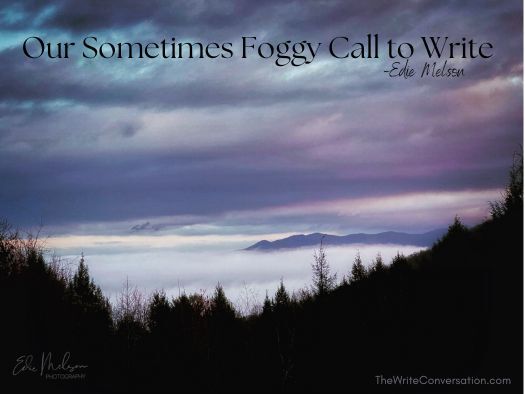
by Edie Melson @EdieMelson
And the LORD went before them by day in a pillar of cloud to lead them along the way, and by night in a pillar of fire to give them light, that they might travel by day and by night. Exodus 13:21 ESV
I always treasure the times when I go to the mountains and get to witness the clouds hanging low in the valleys. It won't be long until I get to spend an entire week there for the Blue Ridge Mountains Christian Writers Conference.
The morning I took this picture was special because I'd been studying the book of Exodus. This sight reminded me again of how God accompanied the Israelites—by night a pillar of fire and by day a column of cloud.
As I stared across the valley my thoughts turned to God, His presence, His creation, His grace, and His calling. Sometimes in our writing life, our calling is clear. There are times when, like the Israelites we can see God almost as clearly as they saw the pillar of fire and the column of a cloud. But there are other times when we're IN the valley and we are covered up with God—surrounded and insulated by His tangible presence—but we can't actually see Him.
The thing we have to remember is this. Whether we're able to see God clearly, sense Him insulating us, or just wondering where He is, God is still with us. Not seeing or sensing God never means He has abandoned us. God doesn't abandon us—ever.
We keep moving forward, doing the last thing He told us to do. We can rest in the truth that if we get off track, He is big enough to get our attention and guide us back into the way He wants us to go. So it's time to look at this picture and figure out where you are. And take comfort in the fact that God is always present.
It is the Lord who goes before you. He will be with you; he will not leave you or forsake you. Do not fear or be dismayed.” Deuteronomy 31:8 ESV
What Bible verse(s) sustains you through the ups and downs of writing? Share your thoughts in the comments section below.
Don't forget to join the conversation!Blessings,Edie
TWEETABLEOur Sometimes Foggy Call to Write from @EdieMelson (Click to Tweet)
 Edie Melson is a woman of faith with ink-stained fingers observing life through the lens of her camera. No matter whether she’s talking to writers, entrepreneurs, or readers, her first advice is always “Find your voice, live your story.” As an author, blogger, and speaker she’s encouraged and challenged audiences across the country and around the world. Her numerous books reflect her passion to help others develop the strength of their God-given gifts and apply them to their lives. Connect with her on her website, through Facebook, Twitter and Instagram.
Edie Melson is a woman of faith with ink-stained fingers observing life through the lens of her camera. No matter whether she’s talking to writers, entrepreneurs, or readers, her first advice is always “Find your voice, live your story.” As an author, blogger, and speaker she’s encouraged and challenged audiences across the country and around the world. Her numerous books reflect her passion to help others develop the strength of their God-given gifts and apply them to their lives. Connect with her on her website, through Facebook, Twitter and Instagram.
Published on April 26, 2025 22:00
April 25, 2025
When the Hero in Your Manuscript Can’t—or Shouldn’t—Change
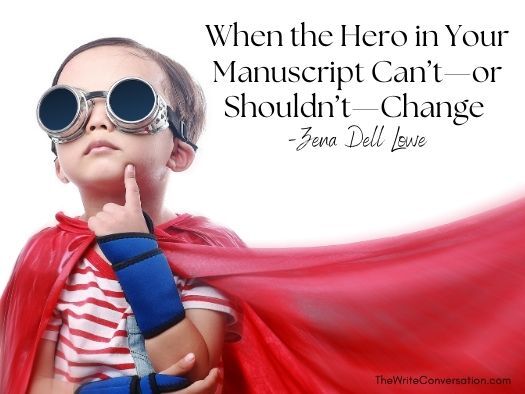
by Zena Dell Lowe @ZenaDellLowe
A writer friend recently reached out with a concern. He was telling the true story of a real-life hero who led a dangerous mission to rescue 15 American kids from Afghanistan. The man faces real challenges—age, a heart condition, world weariness—but he doesn’t change in the traditional sense. He just keeps going, because that’s who he is at his core.
So, my friend asked: Can a story work if the hero doesn’t change?
Short answer? Absolutely.
This taps into a deeper issue: our misunderstanding of what it means for a character to have a flaw, or to grow. The assumption is that the main character must undergo a transformation. But in truth, some of the greatest heroes in storytelling don’t change who they are — they double down.
Here are seven insights to reframe how we think about character flaws and arcs — with examples to help you see how they work in action.
1. Character flaws aren’t always negative.We assume flaws are bad traits to be overcome. But sometimes, a flaw is a noble conviction that causes suffering. The goal isn’t to discard it — it’s to endure it.
🔹 Example: Captain America (MCU) — His flaw is his unwavering moral center. He refuses to trade freedom for security, even when pressured by powerful institutions. He doesn’t bend to fit the times. And that “flaw” becomes the reason he leads the Avengers.
2. Moral conviction = flaw in a suffering-averse world.In a culture that avoids discomfort, characters who suffer for their principles are labeled difficult or dangerous. Their refusal to compromise reveals the rest of us.
🔹 Example: Atticus Finch in To Kill a Mockingbird — His moral compass isolates him. He loses friends, earns scorn, and puts his children at risk by defending an innocent Black man in a racist town. He doesn’t change — he endures.
3. Sometimes the “flaw” is the hero’s greatness.That moral conviction is what makes them heroic. But it also costs them dearly. That’s the real arc: not transformation, but sacrifice.
🔹 Example: Frodo Baggins — He begins with courage and resolve, and he never loses those traits. But they come at a terrible cost. By the end of The Lord of the Rings, Frodo is wounded—physically, emotionally, spiritually—and can no longer live in the world he saved.
4. The flaw causes pain.Heroes who refuse to compromise often pay relational, professional, or psychological prices. The pain isn’t proof of failure—it’s the cost of holding the line.
🔹 Example: Harry Bosch (TV series Bosch) — He loses jobs, alienates colleagues, and lives with constant suspicion because he won’t play by political rules. He’s hated by those in power and haunted by what it costs him.
5. The struggle is over roles.These heroes often face mutually exclusive roles. They want to be both father and protector, lover and leader, but can’t fulfill both without betraying who they are.
🔹 Example: Batman / Bruce Wayne — He can’t be Gotham’s Dark Knight and a normal man in love with Rachel. She sees it. He knows it. And ultimately, he chooses the city over the woman he loves.
6. The type of flaw should fit your story.Ask: Does your hero need to overcome something broken, or endure something noble that causes suffering?
🔹 Example of transformation flaw: Tony Stark — He begins as arrogant and selfish, but evolves into someone who lays down his life for others.🔹 Example of enduring flaw: William Wallace in Braveheart — His refusal to kneel to tyranny leads to betrayal, torture, and death. But he dies unchanged — shouting "Freedom!" to the end.
7. These characters suffer because they can’t change.The world wants them to. Their loved ones beg them to. But they can’t. The arc isn’t about transformation — it’s about endurance and loss.
🔹 Example: The Mandalorian — His code as a Mandalorian compels him to protect Grogu at all costs. He sacrifices safety, alliances, and comfort. He doesn’t stop being who he is — he becomes more fully who he already was.
So, yes — your hero doesn’t have to change to make the story work. But they do have to suffer. Their arc becomes a portrait of sacrifice, conviction, and consequence. Their internal war is not who they are, but what it costs to remain that way.
That’s still an arc. That’s still compelling. That still counts.
Go forth, and tell it well.
TWEETABLEWhen the Hero in Your Manuscript Can't—or Shouldn't—Change from @ZenaDellLowe on @EdieMelson (Click to Tweet)
 Zena has worked professionally in the entertainment industry for over 20 years as a writer, producer, director, actress, and story consultant. Zena also teaches advanced classes on writing all over the country. As a writer, Zena has won numerous awards for her work. She also has several feature film projects in development through her independent production company, Mission Ranch Films. In addition to her work as a filmmaker, Zena launched The Storyteller’s Mission with Zena Dell Lowe, a podcast designed to serve the whole artist, not just focus on craft. In 2021, Zena launched The Storyteller’s Mission Online Platform, where she offers advanced classes and other key services to writers. Zena loves story and loves to support storytellers. Her passion is to equip artists of all levels to achieve excellence at their craft, so that they will truly have everything they need to change the world for the better through story.
Zena has worked professionally in the entertainment industry for over 20 years as a writer, producer, director, actress, and story consultant. Zena also teaches advanced classes on writing all over the country. As a writer, Zena has won numerous awards for her work. She also has several feature film projects in development through her independent production company, Mission Ranch Films. In addition to her work as a filmmaker, Zena launched The Storyteller’s Mission with Zena Dell Lowe, a podcast designed to serve the whole artist, not just focus on craft. In 2021, Zena launched The Storyteller’s Mission Online Platform, where she offers advanced classes and other key services to writers. Zena loves story and loves to support storytellers. Her passion is to equip artists of all levels to achieve excellence at their craft, so that they will truly have everything they need to change the world for the better through story.To find out more about Zena or her current courses and projects, check out her websites at WWW.MISSIONRANCHFILMS.COM and WWW.THESTORYTELLERSMISSION.COM
Published on April 25, 2025 22:00



